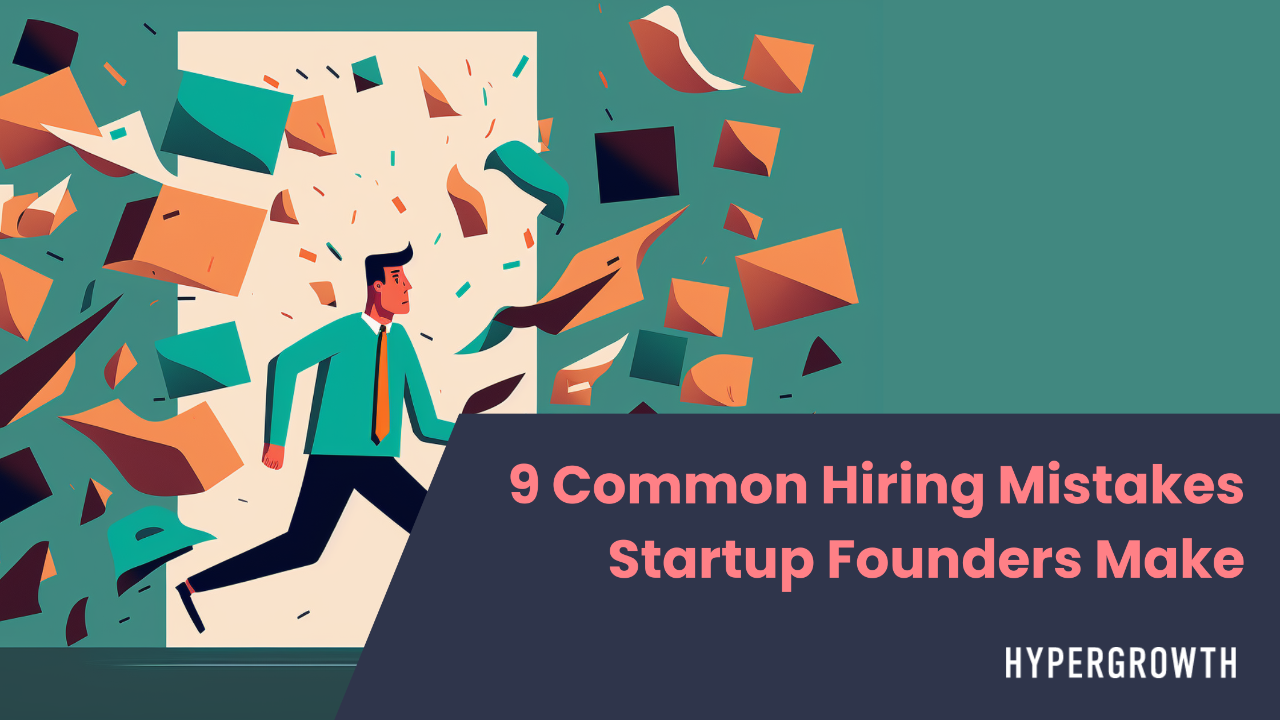9 Common Hiring Mistakes Startup Founders Make

In a startup, your team is the difference between success and failure. If you make the wrong hire early on, it could be disastrous. Therefore, it is important to know what potential hiring mistakes to avoid. Fortunately, these mistakes are easy to spot and prevent in advance.
Sam Altman, founder of the prestigious Y Combinator accelerator, says “mediocre people at a big company cause some problems, but they don’t usually kill the company. A single mediocre hire in the first five will kill a startup.”
Unclear or Misleading Job Description
One important step in the hiring process is having a clear and comprehensive job description. This helps guide your search for great candidates and allows you to accurately evaluate how well their skills and experience match the requirements of the role. A thorough job description should include a list of responsibilities, required skills and qualifications, personality traits, and any other desired capabilities. It should also explain how the position will add value to your startup. By having a well-defined job description, you can ensure that you are attracting the right person and making informed decisions during the hiring process.
Relying On Your Network
A quick approach to expanding your team is to look within your network. Perhaps you are tempted to recruit friend because you are familiar with them. You may think this will save you money and time, or even be beneficial for your early stage startup culture. The difficulty with this hiring process is that the majority of applicants are usually not suitable, as you most likely need to fill a role with very specific requirements. Bringing them on board may have a detrimental effect on the future success of your startup.
Just image that it does not work out. Letting people go is always a tricky thing to do, especially if personal feelings or a friendship are involved. Time is the fuel of any successful startup, and the more you invest in launching, learning, tweaking, hiring, and firing, the more improbable your success will be.
Preferring to hire generalists over specialists
As a startup founder, it may be tempting to search for that one perfect developer who can excel in coding, product development, and generating enthusiasm for your product. However, this approach may not be practical when you are under pressure to launch your product. Instead, consider building a team of specialists who have different areas of expertise. This way, you can build a team that complements each other's skills and can cover all the necessary skill sets for your product. To do this, it is important to have a clear understanding of the specific skills your product requires at each stage of development, and then look for candidates who specialise in those areas.
Hiring Full-Time Employees before Product-Market-Fit
According to Marc Andressen, the most crucial part of your business in the early stages is finding product-market fit. During this time, you'll be trying out a lot of different ideas at a rapid rate. Anyone other than the startup founders can easily become frustrated with the frequent shifts and start to question the value of giving up their job for this.
In this phase, you want to keep the cost structure lean and flexible. Hiring external, freelance growth talent, consultants or advisors will help you to save costs and stay flexible. In this phase you don’t know yet the skillset of your future Head of Growth.
Need an Elite Growth Marketer?
We help you hire verified, high-performing growth marketers!
End to End. Tested & Vetted. No Upfront Fees. Fast.
Not Considering the Cultural and Value Fit
In a startup environment, it's important for employees to be able to adapt to change and handle multiple tasks efficiently. Candidates who are not strategic or struggle with change may not thrive in a fast-paced startup culture. A good way to gauge if a person is a good fit for your startup is to see if they have prior experience working in an early stage startup or an understanding of startup culture. You can also have them spend some time observing how your team operates to get a sense of the pace, energy, and initiative required for success. If they seem excited rather than anxious after this experience, they may be a good fit for your team.
Unstructured and too Easy Interviews
Your job interview is an opportunity to connect with prospective hires, explore if they are suitable for the role you are offering, and determine if they have come prepared with answers to the general questions they anticipate being asked.
However, relying solely on these generic questions during the interview process won't give you the insight you require to know if the talent is the right fit for the early stage startup job. You need to ask in-depth questions that reflect on their hard- and soft skills, values, personality and working style.
Ideally you assess these with standardised assessment tests. Without standardised testing and an objective documentation you are on the risk to being biased and make a hiring mistake.
Opaque Interview Process
Interviews are an opportunity for job seekers to learn more about their prospective employers. Don't try to deceive applicants. Some startups tend to obscure the facts about their business during the recruitment process. This presents a false image of the organisation, which can lead to confusion down the line.
Being as candid as possible will get a potential great candidate excited to tackle the challenge with you. If they're passionate about the problem, they'll be even more eager to join your team. Don’t hide anything.
Relying on the First Impression
It's common for employers to make hiring decisions based on whether or not they like a candidate, rather than evaluating their skills and fit for the position. However, relying on first impressions can lead to a bad hire. It's important to recognise that job interviews can be intimidating for candidates and that it's unrealistic to expect perfection from every applicant. Instead of trying to validate a good or bad initial impression, hiring managers should actively try to disprove their initial thoughts about a candidate. By doing so, they can mitigate the risk of making a mistake in the hiring process.
Downplaying Red Flags
In the current atmosphere where top-notch talent is scarce, it can be difficult to let go of a prospect who meets all the requirements. This causes us to go for the person who could make our goals happen in a matter of weeks, ignoring some clear warning signs. I'm sure we have all been there - we have noticed these signs in the interviews but ignored them because the candidate had a brilliant resume.
Though they may have plenty of expertise and an impressive CV, they may not sync with your company culture.
Pay attention to any red flags that may appear and trust your intuition when looking for potential hires. Be sure to consider all the facts before bringing someone on board. If they don't seem like the right person for the job, don't hire them!
Let’s Sum It Up
Hiring is a crucial process for any startup. The wrong hire early on can be disastrous and impact the future success of the business. To avoid making costly mistakes, startups should avoid relying on their network, considering only one skill, hiring full-time employees before product-market fit, asking only basic interview questions, hiding details during interviews, and ignoring red flags. Instead, they should look for adaptable employees, use standardised assessment tests, be transparent during the recruitment process, and be willing to let go of a candidate who may not be the right fit.
Need an Elite Growth Marketer?
We help you hire verified, high-performing growth marketers!
End to End. Tested & Vetted. No Upfront Fees. Fast.







